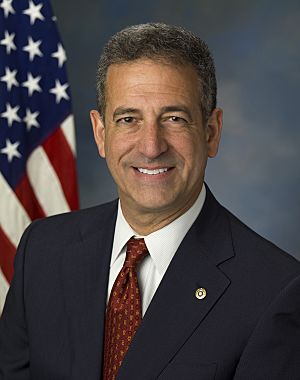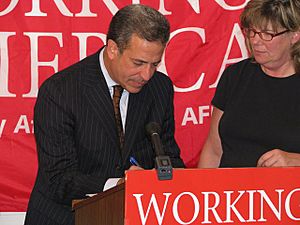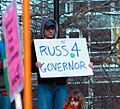Russ Feingold facts for kids
Quick facts for kids
Russ Feingold
|
|
|---|---|
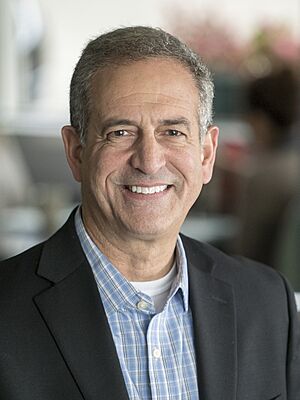
Feingold in 2015
|
|
| United States Special Envoy for the African Great Lakes and the Congo-Kinshasa | |
| In office July 18, 2013 – March 6, 2015 |
|
| President | Barack Obama |
| Preceded by | Barrie Walkley |
| Succeeded by | Tom Perriello |
| United States Senator from Wisconsin |
|
| In office January 3, 1993 – January 3, 2011 |
|
| Preceded by | Bob Kasten |
| Succeeded by | Ron Johnson |
| Member of the Wisconsin Senate from the 27th district |
|
| In office January 3, 1983 – January 3, 1993 |
|
| Preceded by | Everett Bidwell |
| Succeeded by | Joseph Wineke |
| Personal details | |
| Born |
Russell Dana Feingold
March 2, 1953 Janesville, Wisconsin, U.S. |
| Political party | Democratic |
| Spouses |
Sue Levine
(m. 1977; div. 1986)Mary Speerschneider
(m. 1991; div. 2005)Christine Ferdinand
(m. 2013) |
| Children | 2 |
| Education | University of Wisconsin–Madison (BA) Magdalen College, Oxford (BA) Harvard University (JD) |
| Signature | |
Russell Dana Feingold (born March 2, 1953) is an American lawyer and politician. He served as a United States Senator for Wisconsin from 1993 to 2011. As a member of the Democratic Party, he was known for working with politicians from other parties.
Feingold is famous for co-sponsoring the McCain–Feingold Act with Senator John McCain. This law was a major attempt to reform how political campaigns are funded. He was also the only senator to vote against the Patriot Act in 2001, a law passed after the September 11th attacks.
After his time in the Senate, Feingold served as a special diplomat for the Great Lakes region of Africa. He later became the president of the American Constitution Society in 2020.
Contents
Early Life and Education
Russell "Russ" Feingold was born in Janesville, Wisconsin, to a Jewish family. His father was a lawyer, and his mother worked at a title company. Growing up, his father and older brother helped shape his interest in politics.
As a young man, Feingold was active in youth groups. He also volunteered for political campaigns, showing his early passion for public service.
Feingold was an excellent student. After high school, he went to the University of Wisconsin–Madison. He then won a famous Rhodes Scholarship to study at the University of Oxford in England. He finished his education at Harvard Law School, earning a law degree in 1979. Before entering politics, he worked as a lawyer for several years.
Start in Wisconsin Politics
In 1982, Feingold was elected to the Wisconsin Senate. This was his first major role in government. He served there for ten years. This experience prepared him for his next step: running for the U.S. Senate.
Career in the U.S. Senate
Feingold served three terms in the U.S. Senate, representing Wisconsin for 18 years. He was known for his unique campaign style and independent political views.
How He Got Elected
1992 Election
In 1992, Feingold ran for the U.S. Senate. He was not well-known at the time. To get voters' attention, he painted five promises on his garage door, calling it a contract with the people of Wisconsin. He also used humor in his ads, including one with an Elvis Presley impersonator. He won the election with 53% of the vote.
1998 Election
For his re-election in 1998, Feingold set a limit on how much money he would spend on his campaign. He wanted to show his commitment to reforming campaign finance. He won a close race with about 51% of the vote.
2004 Election
In 2004, Feingold won his third term in the Senate by a larger margin, getting 55% of the vote. This time, he raised more money for his campaign but continued to be a voice for campaign finance reform.
Later Elections
Feingold ran for the Senate again in 2010 and 2016 but was defeated in both elections by his Republican opponent, Ron Johnson.
Key Issues and Votes
During his time in the Senate, Feingold was known as a "maverick," meaning he often made decisions based on his own beliefs, even if it meant disagreeing with his own party.
Campaign Finance Reform
Feingold's most famous achievement was the Bipartisan Campaign Reform Act of 2002, also known as the McCain-Feingold Act. He worked with Republican Senator John McCain on this law. It aimed to limit the influence of large, unregulated money donations in politics.
The Patriot Act
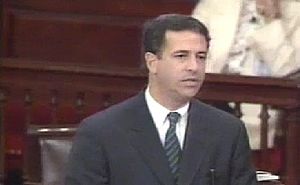
In 2001, after the 9/11 terrorist attacks, Congress passed the Patriot Act. This law gave the government new powers to gather information to prevent future attacks. Feingold was the only senator to vote against it. He argued that it went too far and could violate the civil liberties, or personal freedoms, of American citizens.
War in Iraq
Feingold was one of 23 senators who voted against authorizing the use of force in Iraq in 2002. In 2005, he became the first senator to call for a specific timeline to bring American troops home from the war.
Health Care
Feingold supported the idea of universal health care, where every American would have health insurance. He voted for the Patient Protection and Affordable Care Act in 2009. This law made major changes to the U.S. health care system.
Life After the Senate
After leaving the Senate in 2011, Feingold remained active in public life. He taught at several universities, including Marquette University Law School and Stanford Law School. He also wrote a book called While America Sleeps: A Wake-Up Call to the Post-9/11 World.
From 2013 to 2015, he served as the U.S. Special Representative for the Great Lakes region of Africa. In this role, he worked on peace and security issues in countries like the Democratic Republic of the Congo.
In 2020, Feingold became the president of the American Constitution Society, an organization of lawyers and law students that promotes progressive ideas about the U.S. Constitution.
Personal Life
Feingold lives in Middleton, Wisconsin. He has been married three times and has two children from his first marriage. He is a member of the Beth Hillel Temple in Kenosha, Wisconsin.
Images for kids
See also
 In Spanish: Russ Feingold para niños
In Spanish: Russ Feingold para niños
- List of Harvard University politicians
- List of Jewish members of the United States Congress


